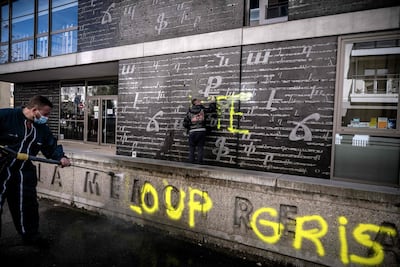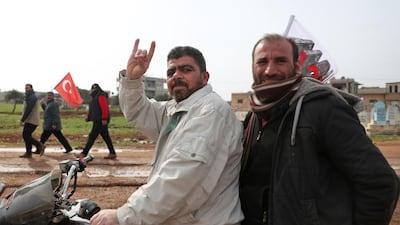French plans to ban the Turkish ultranationalist Grey Wolves have highlighted the group’s close ties to some of Turkey’s darkest and most violent episodes.
Founded in the late 1960s, the Grey Wolves are typically identified as the militant youth wing of the Nationalist Action Party, or MHP, which has been allied to President Recep Tayyip Erdogan’s government since 2015.
The group rose to prominence during the political violence of the 1970s when thousands of people on both the left and right were killed in street battles and murders.
Over the following decades, the Grey Wolves became further entrenched in Turkish life, to the extent that today leading politicians including Mr Erdogan often display their salute – the middle fingers touching the thumb with the outer fingers raised to form a wolf’s head – when rallying nationalist sentiment.
The French cabinet decision to ban the organisation – due on Wednesday following attacks on the Armenian community in Lyon – also demonstrates how far they have infiltrated the Turkish diaspora in Europe.
Germany and Austria – homes to Europe’s largest Turkish migrant communities – have long voiced concerns about the presence of what many consider to be a neo-fascist organisation, a label rejected by its supporters.
Last year, Austria outlawed the Grey Wolves’ salute, a move condemned by the Turkish government. When Germany considered a similar ban a year earlier, Left Party MP Sevim Dagdelen compared the gesture to the Nazi salute and called the Grey Wolves “one of the largest right-wing extremist and anti-constitutional organisations in Germany”.

The movement’s followers typically adopt a Turkish-Sunni Muslim identity and have usually been associated with opposition to Turkey’s minorities, such as Kurds, Armenians, Greeks and Alevis, as well as to leftists.
The Grey Wolves have been linked to a number of violent outrages such as a 1978 pogrom in the southern city of Kahramanmaras that left more than 100 people dead, mostly Alevis, whose beliefs mix Islam with local traditions.
They later became associated with the Turkish “deep state”, which saw elements of the military allied with the far-right and organised crime to tackle threats from the left and the Kurdistan Workers’ Party, or PKK, during the 1980s and 1990s.
These ties were laid bare during the peak of the conflict with the PKK in one of Turkey’s most notorious incidents, the Susurluk scandal.
A simple traffic accident in western Turkey took on greater significance when the occupants of the car were revealed to be an Istanbul police chief, an MP and a former Grey Wolves leader, Abdullah Catli, a wanted hitman and convicted heroin trafficker.
Mr Catli, who died in the 1996 crash, had links to crimes including the murders of seven leftist students in Ankara in 1978 and, a year later, the jailbreak of the man who later shot Pope John Paul II.
A parliamentary inquiry after the crash found that Turkish intelligence had been recruiting ultranationalist criminals to assassinate PKK supporters and Armenian militants.
Although ties between Turkish nationalists and organised crime are not merely historical – Mr Erdogan’s ally, MHP leader Devlet Bahceli, was instrumental in the prison release of a well-known mafia boss earlier this year – few believe they lie at the root of the French ban.
Berk Esen, assistant professor of political science at Istanbul’s Sabanci University, said the move was part of a recent fallout between Mr Erdogan and French President Emmanuel Macron.
“This is an instrument Macron is using to get back at Erdogan because he knows the MHP is a coalition partner and he’s looking for ways of humiliating the Turkish government, attacking Erdogan and weakening his base,” Dr Esen said.
Facing an election in less than 18 months, Mr Macron has adopted a “strongman” stance to prevent right-wing populists such as Marine Le Pen from gaining ground, he added.

